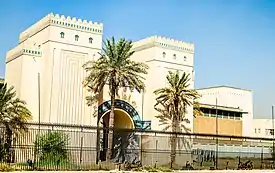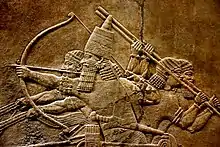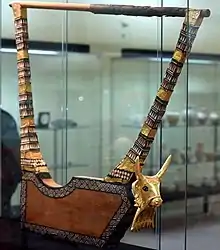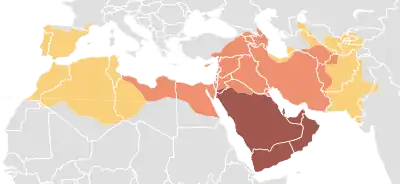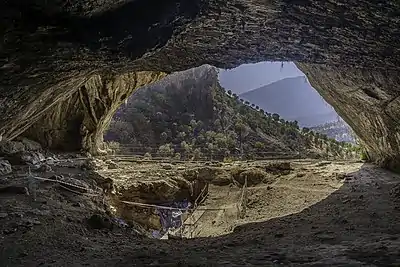The Iraq PortalA view of Baghdad, Iraq
Iraq, officially the Republic of Iraq, is an Arab country in West Asia and in the geopolitical region known as the Middle East. With a population of over 46 million, it is the 14th-most populous country on the Asian continent and the 33rd-most populous country in the world. It is a federal parliamentary republic that consists of 19 governorates. The country is bordered by Turkey to the north, Iran to the east, the Persian Gulf and Kuwait to the southeast, Saudi Arabia to the south, Jordan to the southwest, and Syria to the west. The capital and largest city is Baghdad. The Iraqi people are diverse, with similarly diverse geography and wildlife. Most Iraqis are Muslims – minority faiths include Christianity, Yazidism, Mandaeism, Yarsanism, and Zoroastrianism. The official languages of Iraq are Arabic and Kurdish; others also recognized in specific regions are Turkish (Turkmen), Suret (Assyrian), and Armenian. Modern Iraq dates to 1920, when the British Mandate for Mesopotamia was created under the authority of the League of Nations. A British-backed monarchy was established in 1921 under Faisal. The Hashemite Kingdom of Iraq gained independence from the UK in 1932. In 1958, the monarchy was overthrown and the Iraqi Republic created. Iraq was ruled by the Arab Socialist Ba'ath Party from 1968 until 2003, led by Ahmad Hassan al-Bakr and then by Saddam Hussein, as a one-party state. Iraq invaded Iran in 1980, sparking a protracted war that ended as a stalemate in 1988, with devastating losses for both sides. In 1990, Iraq invaded Kuwait, leading to global condemnation and a military campaign waged by a US-led international coalition that expelled Iraqi forces from Kuwait. A 2003 invasion launched by another US-led coalition as part of its "Global War on Terror" resulted in the defeat of Ba'athist Iraq and the execution of Saddam Hussein. Discontent with the de-Ba'athification policies of the Provisional Authority stirred up an anti-American insurgency, which escalated into a sectarian civil war. In 2005, a new constitution was adopted and multi-party parliamentary elections were held in Iraq. The Withdrawal of US troops from Iraq began in 2008, and the American occupation officially ended in 2011. Continued repression and sectarian policies of Nouri al-Maliki's Shia government caused the 2012–13 Iraqi protests, after which a coalition of Ba'athist and Sunni militias took up arms during the 2013 Anbar campaign. The climax of the campaign was the Northern Iraq offensive by the Islamic State group that marked its rapid territorial expansion, prompting the return of American troops to fight the War in Iraq, which lasted until 2017. Iran has also intervened in Iraq since 2014, expanding its influence through sectarian parties and Khomeinist militia groups, triggering widespread protests in Iraq. (Full article...) Selected article - A folded Sidara. Al-Sidara (Arabic: السدارة), also known as the Iraqi Sidara (Arabic: السدارة العراقية) or al-Faisaliyya (Arabic: الفيصلية), is a cap that can be folded flat when not being worn. The hat was introduced by King Faisal I of Iraq shortly after gaining independence from the United Kingdom, with the intention to create a national dress for the head and to distinguish the people of Iraq from neighboring countries, most notably the Ottomans, who wore the Fez, and Arabs of the Arabian Peninsula, who wore the thawb. While the headwear's usage declined after the fall of the monarchy, the cap is still worn during special occasions and weddings. The headwear has also helped to distinguished Iraqis from other Middle Easterners and its introduction into Iraqi society by King Faisal I was regarded as one of the factors that created the modern Iraqi state. it comes in various colors, most commonly black. (Full article...)Selected picture
Old building in Nineveh Did you know...
Selected biography -
General imagesThe following are images from various Iraq-related articles on Wikipedia.
ListsTopicsCategoriesCategory puzzle Select [►] to view subcategories
Iraq Iraq-related lists Annual events in Iraq Iraqi culture Economy of Iraq Education in Iraq Geography of Iraq Government of Iraq Health in Iraq History of Iraq Organizations based in Iraq Iraqi people Politics of Iraq Society of Iraq Images of Iraq Iraq stubs Related portalsReligions in Iraq Arab states WikiProjects
Things you can do
Associated WikimediaThe following Wikimedia Foundation sister projects provide more on this subject:
Discover Wikipedia using portals
| ||||||||
.jpg.webp)
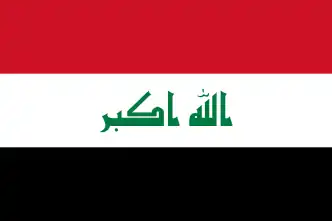

.svg.png.webp)

.jpg.webp)

.jpg.webp)


.svg.png.webp)



.svg.png.webp)


